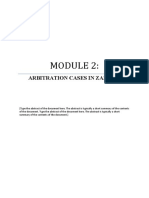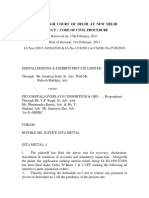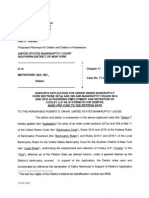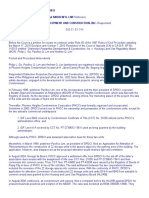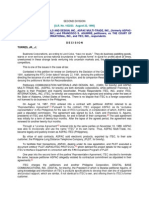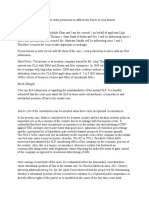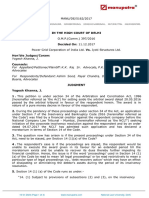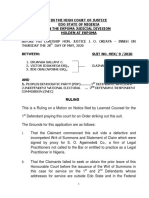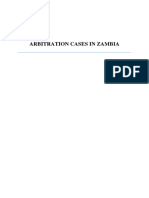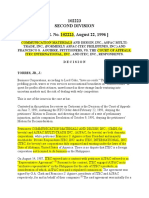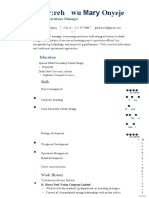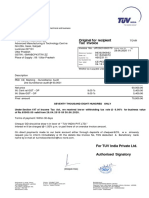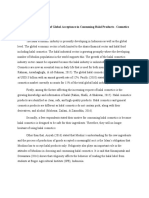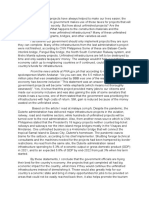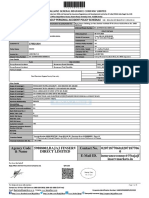Corinth Pipeworks SA v Barclays Bank Plc [2011] DIFC CA 002
JANUARY 22, 2011 COURT OF APPEAL - JUDGMENTS
of Dubai
OF APPEAL
MICHAEL HWANG SC
JUSTICE SIR JOHN CHADWICK H.E. JUSTICE ALI AL MADHANI Between CORINTH PIPEWORKS SA Appellant/Claimant
Hearing: 18 July 2011 Counsel: Michael Black, QC appearing on behalf of Ince & Co Middle East LLP for Appellant/Claimant James Abbott, Clifford Chance LLP for Respondent/Defendant Judgment: 22 January 2012

JUDGMENT Summary of Judgment
on the grounds that the Respondent, as well as a "Registered Company" in the DIFC, was accordingly a "Centre Establishment" under Art (5)(A)(1)(a).The Appellant argued that the DIFC Courts had jurisdiction to hear the claim because the term "Centre Establishment" as used in Article 5(A)(1)(a) of Dubai Law No. 12 of 2004 applied to the Respondent as a single legal entity, not just to its DIFC branch; hence a claim against the Respondent, even in respect of a matter occurring outside the DIFC, could be maintained in the DIFC Courts.The Respondent counter argued that jurisdiction under Article 5(A)(1)(a) would only arise if the claim involved actual conduct by the Respondent's DIFC branch. Since there was no allegation of any material event happening in the DIFC, the DIFC Courts had no jurisdiction.The
of Appeal found that, where a business operates within the DIFC but is not separately incorporated in the DIFC, it is a branch office and not a separate legal entity. The branch is only part of the larger company, similar to a division within a company. Together, the branch office and larger company are a single legal entity. Since the designation "Centre Establishment" must relate to a legal entity, the term does not just apply to the Respondent's DIFC branch but to the Respondent as a whole, including its various branches wherever they are located. However, the wide jurisdiction of the DIFC Courts under this ground will generally be limited by the doctrine of
forum non conveniens
.The Court noted that Law No.16 of 2011 has amended the provisions of Law No.12 of 2004 that are relevant to the appeal. The amended Article 5(A)(1)(a) clarifies that jurisdiction under this heading is met as soon as there is a civil or commercial case involving a "Licensed DIFC Establishment". Unlike jurisdiction under paragraphs (b) and (c) of Article 5(A)(1), paragraph (a) does not require any conduct or transaction by the DIFC branch. The Court also noted that in
Rafed Al Khorafi and others v Bank Sarasin-Alpen (ME) Limited and another
(CA/003/2011), a differently constituted Court of Appeal held that Article 5(A)(1) must be read with the amendments from Law No.16 of 2011, even if Law No.16 of 2011 was not in effect at the time of the original judgment. However, whether Article 5(A)(1) is read with or without the amendments enacted by Law No.16 of 2011 would not affect the outcome of this case.Appeal allowed with costs.
This summary is not part of the Judgment and should not be cited as such
Michael Hwang:
Justice dated 8 February 2011 granting the Respondent's application for a declaration that the DIFC Courts have no jurisdiction to hear this claim. (2) The Appellant is a Greek company which carries on business in Athens. The Respondent is a bank incorporated in England with an unincorporated branch office registered in the DIFC as a "Recognised Company
" within the meaning of Article 115 of DIFC Law No.2 of 2009 (the "DIFC Companies Law 2009") and which has been granted a Commercial Licence as well as a DFSA Licence.
(3) The Appellant seeks damages of some US$24 million representing the loss it has suffered as a result of a series of allegedly false and misleading oral and emailed representations made by one of the Respondent's employees, Mr Joseph Figueredo, in the course of which the Appellant was allegedly reassured that funds due from a customer (a company called AFRAS) for the sale of steel pipes which had already been supplied were safely contained in accounts with the Respondent and were being processed for transmission to the Appellant. (4) As a result of the alleged false representations, the Appellant allegedly refrained from taking steps to secure the assets of AFRAS and ensure that the sums were not dissipated. The Appellant contends that the Respondent permitted AFRAS (or one of its directors) to withdraw the money which had been promised to the Appellant, which has accordingly not been paid to the Appellant. (5) The Appellant brings its claims against the Respondent in deceit, unlawful conspiracy and/or negligence. (6) It is not disputed that the events giving rise to the Appellant's complaints against the Respondent arose as a result of the alleged acts or omissions of an employee who was (at the material time) employed at the Jebel Ali Branch of the Respondent in Dubai. There is no complaint against the DIFC Branch of the Respondent. (7) Before the Deputy Chief Justice, the Respondent argued that the DIFC Courts have no jurisdiction to hear this action because the Appellant could not bring itself within any of the heads of jurisdiction under Article 5(A) of Dubai Law No. 12 of 2004 in respect of The Judicial Authority at Dubai International Financial Centre ("Law No. 12"). On the other hand, the Appellant argued that the Respondent is a "Centre's Establishment" within the meaning of Article 5(A)(1)(a) of Law No. 12, which provides that the DIFC Courts will have exclusive jurisdiction over any of the "Centre's Establishments", which term (expressed as "Centre Establishments
") is defined in Article 2 as:
"Any entity or business duly established or carrying on business in the Centre, including any Licensed Centre Establishments
".
(8) For convenience I will use the term "Centre Establishment" in the singular form and without the apostrophe in this judgment to include "Centre's Establishments". (9) The term "Licensed Centre Establishments" is defined in Article 2 as:
"Any entity licensed, registered or otherwise authorised to carry on financial or banking business including those activities and businesses referred to in Article 9 of the Centre Law" (which is not material for present purposes).
(10) The Appellant further argued that the Respondent company as a whole (and not just its DIFC branch) has been designated a "Licensed Centre Establishment" and thereby a "Centre Establishment" within Article 5(A)(1). (11) The Deputy Chief Justice rejected the arguments of the Appellant and found that the DIFC Courts had no jurisdiction. Accordingly, he allowed the Respondent's application. (12) In the course of this judgment, I will be referring to Law No. 12, which was amended recently by Dubai Law No. (16) of 2011 Amending Certain Provisions of Law No. (12) of 2004 Concerning Dubai International Financial Centre Courts. However, the citations from Law No. 12 are from Law No. 12 as it stood before its amendment since this case has been argued on the basis of the pre-amended Law No. 12. (13) Since this judgment was prepared in draft, the Court of Appeal (differently constituted) has delivered its judgment in
Rafed Al Khorafi v Bank Sarasin
[CA 003/2011]. In his judgment in the present Appeal, Justice Sir John Chadwick (whose judgment I have seen in draft) has explained that the substitution, by Dubai Law No. 16 of 2011, of new provisions for those formerly in Law No. 12 does not affect the outcome of this Appeal. I agree with that view Reasoning of the Court Below (14) The reasoning of the learned Deputy Chief Justice was as follows. (15) The argument advanced by the Appellant would, if correct, have potentially far-reaching consequences. The suggestion that an international company incorporated and having its head office in (say) the United Kingdom, but with a branch registered and licensed to carry on business in the DIFC, could start proceedings in the DIFC Courts or could be sued in those Courts in respect of a claim wholly unconnected with the DIFC or the business of its DIFC branch would, on the face of it, seem distinctly improbable. (16) The Deputy Chief Justice concluded that, if that were the case, the scope of the DIFC Courts would have an international dimension which had not hitherto been generally perceived. (17) The differences between the English Commercial Court and the DIFC Courts were discussed and, in particular, the fact that, in the DIFC Courts, extra-territorial jurisdiction is not derived from a discretionary framework of the kind found in the English legal system in CPR
6.37 (read with Practice Direction 6B). The framework in the English Courts precludes service of English proceedings outside the jurisdiction of the English Courts where the claim falls outside the Council Regulation (EC) No 44/2001 of 22 December 2000 on jurisdiction and the recognition and enforcement of judgments in civil and commercial matters (which the Deputy Chief Justice abbreviated as the "European Judgments Regulation" in his judgment), unless permission is first obtained from the Court upon an application without notice to the intended defendant, which must demonstrate to the Judge
that the claim falls within at least one of the many categories listed in paragraph 3.1 of Practice Direction 6B. The Judge then exercises discretion to grant permission. Once permission is granted and service outside the jurisdiction has been effected, the defendant can then challenge the Court's jurisdiction, including the exercise of the judge's discretion, on the grounds of
forum non conveniens
or the existence of a foreign jurisdiction clause.


